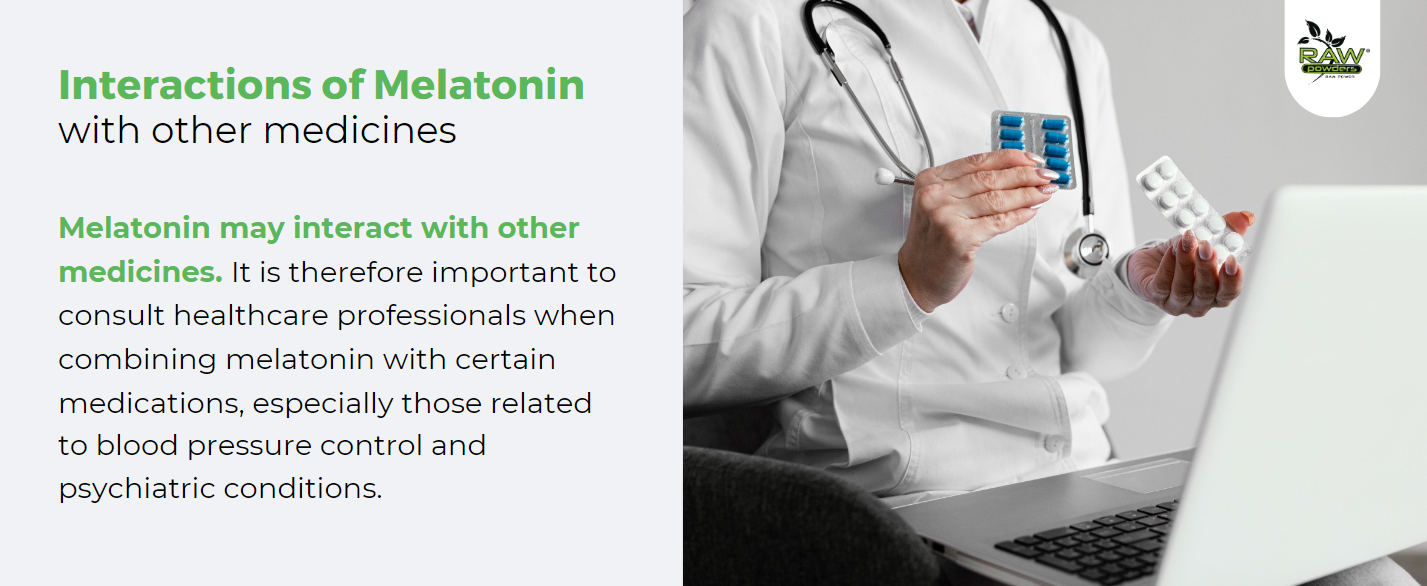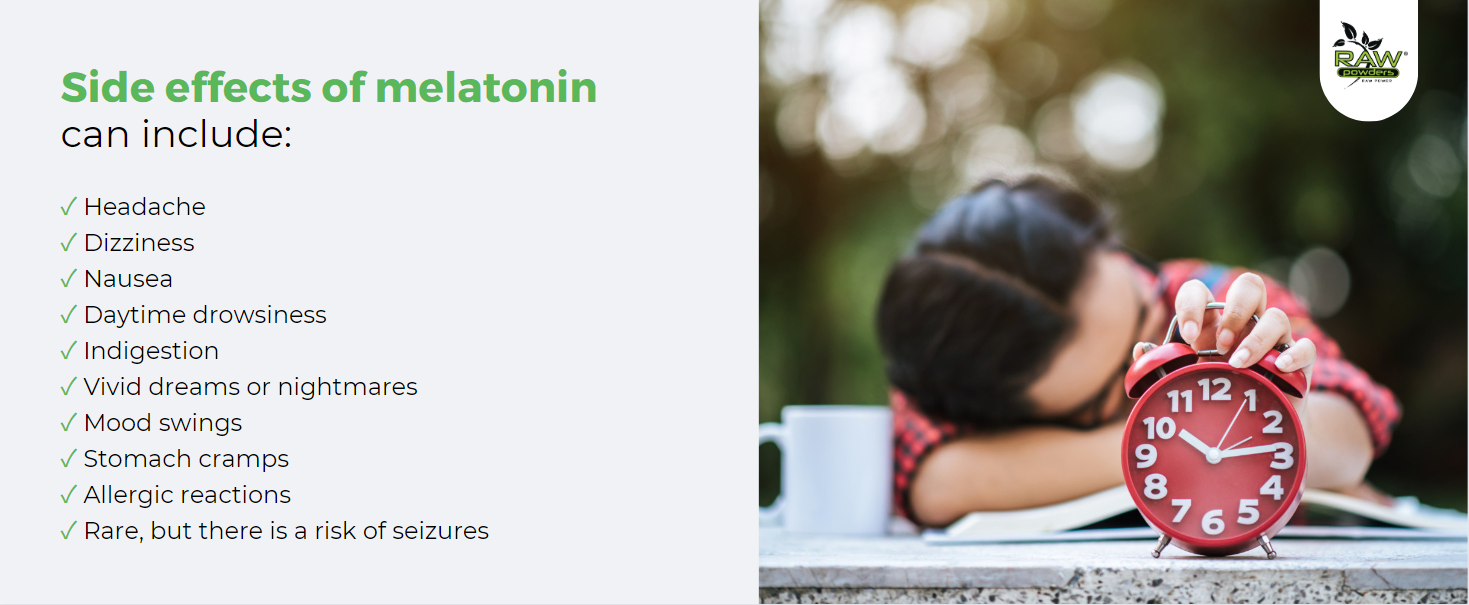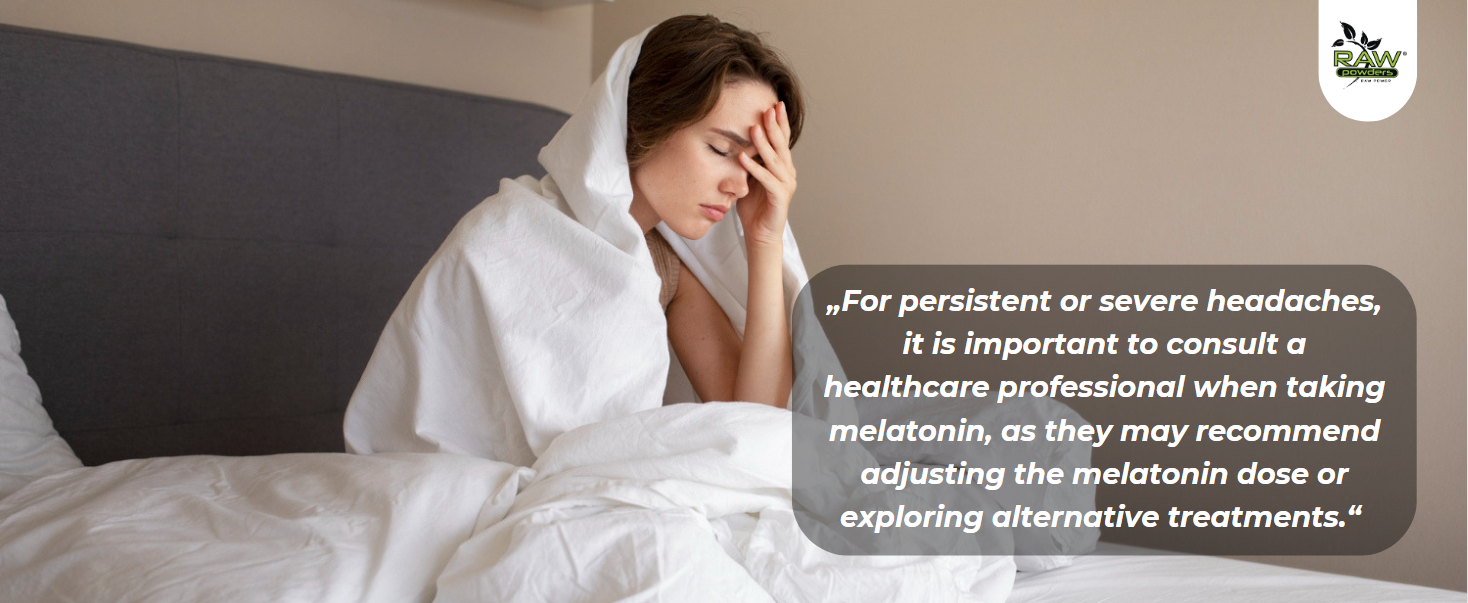MELATONIN - SIDE EFFECTS AND RECOMMENDATIONS

Although melatonin is considered safe for most people, as any other supplement it can have negative side effects.
Melatonin is a naturally occurring hormone produced by the pineal gland in the brain. It plays a significant role in regulating the body's sleep-wake cycle, often referred to as the circadian rhythm. Due to its association with sleep, melatonin supplements have become popular for addressing sleep-related concerns. However, it's important to consult with a healthcare professional before taking any supplements, including melatonin.
Melatonin side effects
Research on melatonin's side effects indicates that while it is generally considered safe for short-term use in adults, there are some potential side effects and interactions with other medications to be aware of. Common side effects include headache, dizziness, nausea, and daytime drowsiness. Less common side effects may involve vivid dreams or nightmares, mood changes, stomach cramps, and in rare cases, increased risk of falls or seizures. Melatonin can also interact with medications that slow blood clotting, prevent seizures, affect blood pressure, and others [1, 2].
For children, while melatonin is sometimes used to help with sleep difficulties, its safety and long-term effects are not fully understood. Health professionals often recommend against its routine use in children due to the lack of comprehensive studies confirming its safety. There's a concern that it could potentially interfere with developmental processes, including puberty [3].
In terms of dosage and long-term use, while melatonin is considered safe in the short term, even at high doses, the long-term effects are less clear, and more research is needed, especially regarding its use in children and potential interactions with other drugs [3].
Daytime sleepiness is a notable concern when melatonin is taken at times other than the evening, due to its intended function to promote sleep. This effect may be exacerbated in individuals with a reduced rate of melatonin clearance, such as older adults and infants [3].
Other areas of concern include possible interactions with sleeping pills, a slight decrease in body temperature, and potential blood-thinning effects. It's important for individuals to consult healthcare providers before starting melatonin, especially if they are taking other medications or have underlying health conditions [3].
Overall, while melatonin is widely used and has a relatively good safety profile for short-term use, individuals should use it cautiously, particularly in children, and seek medical advice for long-term use or when using it alongside other medications.
1. Daytime sleepiness.
Melatonin is usually taken in the evening before going to bed, but some people may feel sleepy or sluggish and passive the next day, even if they have had a good night's sleep. If you're feeling this way don't cycle or use tools or machinery for 4-5 hours after taking melatonin even without these symptoms. Do not drink any alcohol as this will make you feel more tired. If you're taking more than one 2mg tablet, talk to your doctor to see if you can reduce your dose. If this does not help, talk to your doctor as melatonin may not be the right medicine for you.
Research indicates that melatonin can modulate brain activity in ways that resemble actual sleep, suggesting a potential for inducing sleepiness and fatigue. For example, melatonin reduced task-related activity in certain areas of the brain, correlating with subjective measurements of fatigue, which highlights its role in priming sleep-associated brain activation patterns in anticipation of sleep [4]. Moreover, melatonin administration has been shown to improve daytime sleep following night shift work, suggesting its potential to counteract on-the-job sleepiness [5].
2. Headache.
Research on melatonin's association with headaches, particularly as a side effect of its use, has explored various dimensions of how this hormone interacts with headache disorders. However, the main effect of melatonin is additive, with studies showing that it has a positive effect on a wide range of headache types [6, 7, 8].
For individuals experiencing headaches after taking melatonin, it is recommended to ensure adequate rest and hydration. Alcohol consumption can exacerbate headaches and may interfere with melatonin's effectiveness, so it is advisable to avoid or minimize alcohol intake. Consulting a healthcare provider is important for persistent or severe headaches, as they may recommend adjusting the melatonin dose or exploring alternative treatments.
3. Feeling dizzy
If taking melatonin makes you feel dizzy, stop what you're doing and sit or lie down until you feel better. Do not drive, cycle or use tools or machinery if you're feeling dizzy. Do not drink alcohol as it will make you feel worse.
4. Gastrointestinal symptoms.
Research findings suggest that melatonin could be beneficial in managing gastrointestinal symptoms associated with conditions like IBS and might offer protective effects against gastric lesions induced by certain stressors. However, it's important to consult healthcare professionals before starting any new treatment regimen [9, 10, 11, 12].
If you think that melatonin causes abdominal pain and cramps, nausea, diarrhea or constipation:
- In case of nausea, it is recommended to take melatonin tablets or liquid after food. Stick to simple meals and do not eat rich or spicy food. It can help to eat and drink slowly and have smaller and more frequent meals.
- In case of stomach ache, try putting a heat pad or covered hot water bottle on your tummy. Talk to your doctor if the pain continues or is severe.
5. Mood swings.
If you experience mood changes and if you are feeling irritable or restless and if this condition does not get better after a few days, stop taking the supplement and talk to your doctor.
6. Allergic reactions.
Although there is no evidence of allergic reactions recorded, some people may experience rashes, itching or swelling of some parts of the body due to an excess amount of supplement.
If you experience dry or itchy skin, apply a moisturizer often. Try using an oil-free face moisturizer for sensitive skin. If this does not get better after 1 week, stop taking the medicine and talk to your doctor.

7. Drug interactions.
Melatonin may interact with certain medications such as blood thinners, blood pressure regulators or certain psychiatric medications, so you should always consult your doctor before taking melatonin.
- Melatonin and Blood Pressure Regulation: Melatonin has been shown to influence blood pressure regulation both peripherally and centrally. It can exert an antihypertensive effect, which has been observed in both experimental and clinical settings. These effects are mediated through melatonin receptors (MT1 and MT2) and its antioxidant nature, which can improve endothelial function and increase the efficiency of the mitochondrial electron transport chain [13].
- Potential Antihypertensive Treatment: Studies suggest melatonin's potential as an adjunct treatment for hypertension. It has been found to decrease blood pressure in various populations, including individuals with arterial hypertension and non-dipping nighttime blood pressure. The proposed mechanisms include melatonin's effects on endothelial function, autonomic system balance, and specific melatonin receptors [14].
- Interactions with Cardiovascular Function: Melatonin has been noted to differentially affect vascular blood flow in humans. Research indicates that melatonin can increase coronary blood flow and improve cardiac function through the involvement of β-adrenoreceptors, MT1/MT2 receptors, and nitric oxide. These findings highlight the complex interactions between melatonin and cardiovascular regulation, suggesting that melatonin could potentially interact with medications affecting blood pressure and heart function [15].
- Safety and Adverse Events: A critical systematic review focusing on the safety of oral melatonin administration noted that while generally safe, there are potential adverse effects related to endocrine function and cardiovascular parameters, such as blood pressure and heart rate. These effects might be influenced by dosage, dose timing, and interactions with antihypertensive drugs. This highlights the importance of considering potential interactions between melatonin and blood pressure medications [16].
These studies underscore the importance of consulting healthcare providers before combining melatonin with other medications, especially those related to blood pressure regulation and psychiatric conditions. The interaction between melatonin and medications could vary based on individual health conditions, the specific medications taken, and the dosages of melatonin and the medications involved.
8. Strange dreams or night sweats.
Speak to a doctor or pharmacist if the advice on how to cope does not help and a side effect is still bothering you or does not go away.
It is important to always follow the dosage instructions! Taking the supplements correctly can help you avoid side effects. In addition, you should always consult a medical professional before taking supplements, and this also applies to melatonin food supplements. For more on melatonin use and dosing, see the blog All you need to know about melatonin dosing and use.

What should I do if I experience side effects from melatonin?
If you experience a slight abdominal pain or constipation at the beginning of the supplementation, this should last for a very short period of time until your body gets used to the supplements. However, if the symptoms persist for several days, or if additional side effects or even allergic reactions occur, you should seek medical advice immediately. In addition, always make sure you are taking enough fluids and eating a healthy diet.
Serious side effects are rare and happen to less than 1 in 1,000 people. Speak to your doctor if you start feeling low or sad as this could be a sign of depression. Call a doctor immediately if you: get changes to your eyesight, such as blurred vision, feel faint or pass out, start feeling confused or dizzy, or things seem to be spinning around you (vertigo), have any bleeding that does not stop, unexplained bruising or blood in your urine. In rare cases, it's possible to have a serious allergic reaction (anaphylaxis) to melatonin [17].
Melatonin’s interactions with other medicines
Melatonin supplements may interact with certain prescription medicines and should be avoided or discussed with your doctor or pharmacist in advance. Medicines with which melatonin may interact:
- Blood thinners
- Medicines that prevent seizures
- Contraceptives
- Medicines for high blood pressure
- Medicines for diabetes
- Immunosuppressant drugs (immunosuppressants)
- Medicines broken down by the liver
8. etc.
In summary, while not a comprehensive listing, melatonin can interact or be influenced by pharmaceuticals, nutrients, or herbs with blood thinning, blood sugar-lowering, blood pressure reducing, anti-convulsing, sedative, anti-depressant, and/or immunosuppressive activities. Importantly, melatonin metabolism and activity can be potentially impacted by many dietary, supplemental, and pharmaceutical agents, all of which add to the fact that there is variability in an individual’s personalized response to this compound based on their dietary and medical context. Historically, due to the lack of safety data, melatonin supplementation was not recommended for women who are pregnant or nursing. However, there is some indication that melatonin may be of benefit during both these stages. Therefore, having these women consult with a health professional who understands the patient’s personalized needs is key. Talking to your doctor before taking melatonin or any supplement during pregnancy is of utmost importance. Similarly, people diagnosed with any disease should consult their health professionals and take it under medical supervision [18, 19].
Before taking melatonin supplements, consult your doctor first, especially if you have any medical conditions or are taking other medicines. Melatonin supplements available over the counter vary greatly in the amount of melatonin they contain. Your doctor can help you decide whether melatonin is right for you and, if so, which one and what level of pure substance is appropriate for your situation.
Compatibility of Melatonin and Alcohol
Prolonged sleep deprivation can be disastrous and have serious consequences for people's health and psychological well-being. Therefore, some people try to improvise self-medication by mixing melatonin or sedatives with alcohol. This causes serious damage to health. Alcohol and melatonin together can make you sleep very deeply, so you do not breathe properly and can have difficulty waking up. In addition, alcohol interferes with the body's natural release of melatonin, so not only it is not a helper, but it can also have serious negative long-term effects, leading to insomnia symptoms.
The studies available primarily explore the individual effects of melatonin and alcohol on sleep, cognitive function, and physiological health rather than their combined effects. Here are some relevant findings from the research:
- Alcohol's Effect on Melatonin Secretion: Alcohol consumption can suppress melatonin secretion, potentially disrupting sleep patterns and circadian rhythms. This effect may contribute to the sleep disturbances commonly experienced by individuals with alcohol use disorders and could imply negative interactions when alcohol is consumed with melatonin supplements [20].
- Chronobiological Effects of Ethanol and Melatonin: Research indicates that ethanol can alter the circadian regulation of physiological processes, including melatonin secretion. The review by Kurhaluk and Tkachenko (2020) discusses the interplay between alcohol-related disorders and melatonin from a chronobiological perspective, suggesting that disruptions in melatonin rhythms due to alcohol consumption could have significant health implications, including for sleep and inflammation [21].
The combined use of melatonin and alcohol is not extensively researched in terms of direct interactions and effects on sleep quality, cognitive function, and health outcomes. However, given the individual effects of alcohol on melatonin secretion and the potential of melatonin to mitigate some negative consequences of sleep deprivation, caution is advised when considering their concurrent use. Alcohol's ability to suppress melatonin secretion suggests that mixing melatonin with alcohol might not only diminish the effectiveness of melatonin supplements but also exacerbate sleep disturbances and related cognitive impairments. Further research is needed to fully understand the implications of their combined use on health and cognitive functions.
In short, you should never take melatonin and drink alcohol or combine it with sedatives.
Melatonin Deficiency
The balance of melatonin in the body fluctuates for many reasons. On the one hand, melatonin levels steadily decrease as a person ages. However, our working and living environment also affects melatonin levels. (You can read more about what melatonin is and its role in the human body here.) In this case, supplementation may be the solution to maintaining a quality sleeping pattern. Melatonin supplements are often considered safer alternatives to strong sedatives. It is important to note that melatonin not only helps to reduce sleep disturbances but also has other beneficial effects on human health. Read more about the benefits of melatonin in the blog post What are the health benefits of melatonin?
Remember that melatonin, like any other supplement, should not be the first or only remedy you take when trying to solve health problems such as insomnia. It needs to be combined with lifestyle choices that build a solid foundation for good health. This includes basics such as good nutrition, daily exercise, daily mind-body practices, good sleep hygiene and habits, social connections and spirituality.
Medical Disclaimer
The information provided in our articles is solely for educational purposes and should not be considered medical advice or instruction. No action or inaction should be taken based solely on the contents of this information. Readers should consult their health care professional on any matter related to their health and well-being. The information and opinions provided here are believed to be accurate and sound, based on the best judgment available to the authors, but readers who fail to consult with appropriate health authorities assume the risk of any injuries. The publisher is not responsible for errors or omissions.
Please be aware that different countries may have specific regulations and that this disclaimer does not replace the need for consultation with a healthcare provider before beginning or changing a treatment or supplement regimen. The information contained in this article is not intended to diagnose, treat, cure, or prevent any disease. Individual results may vary.
References
- Brent A. Bauer, M.D. Is melatonin a helpful sleep aid — and what should I know about melatonin side effects? Mayo Clinic. Oct. 28, 2022. https://www.mayoclinic.org/healthy-lifestyle/adult-health/expert-answers/melatonin-side-effects/faq-20057874
- Jay Summer, Dr. Nilong Vyas. Melatonin Side Effects. Sleep Foundation. Updated December 20, 2023. https://www.sleepfoundation.org/melatonin/melatonin-side-effects.
- Atli Arnarson BSc, PhD. Side Effects of Melatonin: What Are the Risks?. Healthline Journal. Updated on April 4, 2022. https://www.healthline.com/nutrition/melatonin-side-effects.
- Gorfine, T., Assaf, Y., Goshen-Gottstein, Y., Yeshurun, Y., & Zisapel, N. (2006). Sleep-anticipating effects of melatonin in the human brain. NeuroImage, 31, 410-418. doi: 10.1016/j.neuroimage.2005.11.024. https://www.sciencedirect.com/science/article/abs/pii/S1053811905024766?via%3Dihub.
- Sharkey, K., Fogg, L., & Eastman, C. (2001). Effects of melatonin administration on daytime sleep after simulated night shift work. Journal of Sleep Research, 10. doi: 10.1046/j.1365-2869.2001.00256.x. https://onlinelibrary.wiley.com/doi/10.1046/j.1365-2869.2001.00256.x.
- Peres, M., Masruha, M., Zukerman, E., Moreira-Filho, C., & Cavalheiro, E. (2006). Potential therapeutic use of melatonin in migraine and other headache disorders. Expert Opinion on Investigational Drugs, 15, 367 - 375. doi: 10.1517/13543784.15.4.367. https://www.tandfonline.com/doi/full/10.1517/13543784.15.4.367.
- Bougea, A., Spantideas, N., Lyras, V., Avramidis, T., & Thomaidis, T. (2016). Melatonin 4 mg as prophylactic therapy for primary headaches: a pilot study.. Functional neurology, 31 1, 33-7. doi: 10.11138/FNEUR/2016.31.1.033. https://pubmed.ncbi.nlm.nih.gov/27027892/.
- Leone, M., D’Amico, D., Moschiano, F., Fraschini, F., & Bussone, G. (1996). Melatonin Versus Placebo in the Prophylaxis of Cluster Headache. Cephalalgia, 16, 494 - 496. doi: 10.1046/j.1468-2982.1996.1607494.x. https://journals.sagepub.com/doi/10.1046/j.1468-2982.1996.1607494.x.
- Chojnacki, C., Walecka-Kapica, E., Lokieć, K., Pawłowicz, M., Winczyk, K., Chojnacki, J., & Klupińska, G. (2013). Influence of melatonin on symptoms of irritable bowel syndrome in postmenopausal women.. Endokrynologia Polska, 64 2, 114-20. https://pubmed.ncbi.nlm.nih.gov/23653274/
- Song, G., Leng, P., Gwee, K., Moochhala, S., & Ho, K. (2005). Melatonin improves abdominal pain in irritable bowel syndrome patients who have sleep disturbances: a randomised, double blind, placebo controlled study. Gut, 54, 1402 - 1407. doi: 10.1136/gut.2004.062034. https://gut.bmj.com/content/54/10/1402
- Pc, K., Konturek, S., Majka, J., Zembala, M., & Hahn, E. (1997). Melatonin affords protection against gastric lesions induced by ischemia-reperfusion possibly due to its antioxidant and mucosal microcirculatory effects.. European journal of pharmacology, 322 1, 73-7 . doi: org/10.1016/S0014-2999(97)00051-4. https://www.sciencedirect.com/science/article/abs/pii/S0014299997000514?via%3Dihub
- Dipasquale, V., Palermo, L., Barbalace, A., Tumminello, G., & Romano, C. (2023). Randomised controlled trial of melatonin for paediatric functional abdominal pain disorders. Journal of Paediatrics and Child Health, 59. doi: 10.1111/jpc.16323. https://onlinelibrary.wiley.com/doi/10.1111/jpc.16323.
- Pechanova, O., Paulis, L., & Simko, F. (2014). Peripheral and Central Effects of Melatonin on Blood Pressure Regulation. International Journal of Molecular Sciences, 15, 17920 - 17937. doi: 10.3390/ijms151017920. https://www.mdpi.com/1422-0067/15/10/17920
- Simko, F., & Paulis, L. (2007). Melatonin as a potential antihypertensive treatment. Journal of Pineal Research, 42. doi: 10.1111/j.1600-079X.2007.00436.x. https://onlinelibrary.wiley.com/doi/10.1111/j.1600-079X.2007.00436.x
- Cook, J., Sauder, C., & Ray, C. (2011). Melatonin differentially affects vascular blood flow in humans.. American journal of physiology. Heart and circulatory physiology, 300 2, H670-4 . doi: 10.1152/ajpheart.00710.2010. https://journals.physiology.org/doi/full/10.1152/ajpheart.00710.2010
- Foley, H., & Steel, A. (2019). Adverse events associated with oral administration of melatonin: A critical systematic review of clinical evidence.. Complementary therapies in medicine, 42, 65-81. doi: 10.1016/j.ctim.2018.11.003. https://www.sciencedirect.com/science/article/abs/pii/S0965229918309373?via%3Dihub
- NHS. Side effects of melatonin - Brand names: Circadin Adaflex, Ceyesto, Slenyto, Syncrodin. Page last reviewed: 13 February 2023 Next review due: 13 February 2026. https://www.nhs.uk/medicines/melatonin/side-effects-of-melatonin/.
- Deanna M Minich, Melanie Henning, Catherine Darley, Mona Fahoum, Corey B Schuler, James Frame. Is Melatonin the "Next Vitamin D"?: A Review of Emerging Science, Clinical Uses, Safety, and Dietary Supplements. Review: Nutrients. 2022 Sep 22;14(19):3934. doi: 10.3390/nu14193934. PMID: 36235587 PMCID: PMC9571539. https://pubmed.ncbi.nlm.nih.gov/36235587/
- NHS. Pregnancy, breastfeeding and fertility while taking melatonin. Page last reviewed: 13 February 2023 Next review due: 13 February 2026. https://www.nhs.uk/medicines/melatonin/pregnancy-breastfeeding-and-fertility-while-taking-melatonin/
- Rupp, T., Acebo, C., & Carskadon, M. (2007). Evening Alcohol Suppresses Salivary Melatonin in Young Adults. Chronobiology International, 24, 463 - 470. doi: 10.1080/07420520701420675. https://www.tandfonline.com/doi/full/10.1080/07420520701420675
- Kurhaluk, N., & Tkachenko, H. (2020). Melatonin and alcohol-related disorders. Chronobiology International, 37, 781 - 803. doi: 10.1080/07420528.2020.1761372. https://www.tandfonline.com/doi/full/10.1080/07420528.2020.1761372





_front%20(1)-250x250.png)



_front%20(1)-250x250.png)

-(NN)_front%20(1)-min-250x250.png)

_front%20(1)-250x250.png)


_front%20(1)-min-250x250.png)
_front%20(1)%20(1)-250x250.png)
_front%20(1)%20(1)-250x250.png)
_front%20(1)-min-250x250.png)
_front%20(1)-min-250x250.png)
_front%20(1)%20(1)-250x250.png)
_front%20(1)%20(1)-250x250.png)




